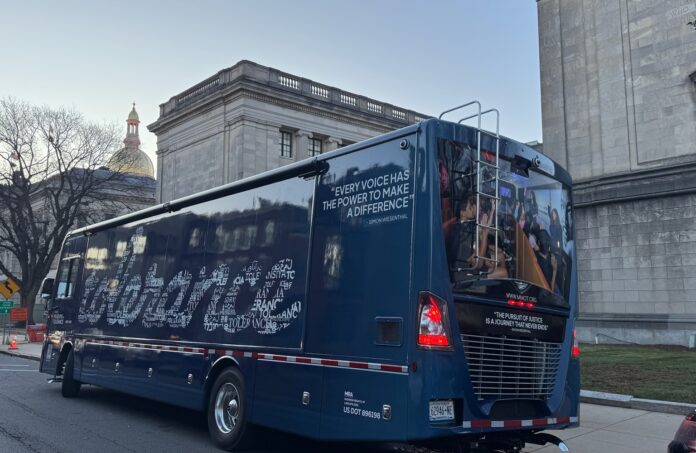[ad_1]

Rabbi Meyer May, standing outside the Statehouse in Trenton and next to the $1.2 million Mobile Museum of Tolerance, a traveling exhibit that the teachings of the Simon Wiesenthal Center in Los Angeles on the road, couldn’t rattle of the numbers fast enough.
Consider:
- The center already has ten of these mobile museums going across the country and is looking to get Legislatures to fund 40 more (hence the stop in Trenton);
- The mobile museums have an hour-long program that can educate up to 30 students at once;
- The mobile museums have proved to be so popular that one (based in Illinois) already has a waiting list that goes into 2027;
- And, perhaps the most impressive, the mobile museums are meant to serve the non-Jewish community – and do so in great numbers.
“The Simon Wiesenthal Cener, now in its 47th year, has had more than 8 million visitors since it opened, including 3 million kids in school groups,” he started. “Remarkably, 93% of them are children of color, and 98% total are not Jewish kids.
“We are the largest diversity training program the United States. We’ve trained more than 180,000 frontline criminal justice professionals and almost 90,000 frontline educators in California on the Holocaust and related subjects.”

Meyer, however, knows it’s not enough.
“While we do things to great scale, we realize that not everybody can get to a big museum,” he said.
Therein lies the creation of the ten mobile museums, two of which are stationed in New York.
Meyer now spends much of his time traveling around the country, extolling the virtues of an education factory on wheels, trying to get more.
In Trenton, he was able to give Assembly Speaker Craig Coughlin and other legislatures are tour.
Meyer said they came away impressed. Of course, the true test will come during budget season. The mobile museum not only comes with an initial $1.2 million price tag – he said approximately the same amount of funding is needed for its annual operation.
Meyer said he knows budgets are tight, but he also knows that a wave of antisemitism in this country – unlike anything he has seen in his lifetime – is upon us.
“Oct. 7 unleashed the most illogical and metastasizing antisemitism that any American Jew has seen since the Holocaust,” he said. “And it’s so counterintuitive. Any fair-minded, objective person seemingly should think there’s no place in this world for murdering 12,000 people, including 300 kids, murdering grandmothers, raping women and mutilating them.”
The nonsensical acceptance of hate goes beyond the Jewish community, he said.
“We’re in a world where half the people are lauding what this kid did to the CEO United Healthcare,” he said. “How has that not been universally condemned? There are people who want to make movies about this barbarism.”
That’s why Meyer wants to teach acceptance – and about turning away from hate. He feels he can do it from these mobile museums.
“We can bring our teachings to the people,” he said.

Doing it in New Jersey would have special meaning. Meyer moved to Lakewood when he was 10 and graduated high school from a Jewish Day School in the area. And while it has been years since he has lived here, Meyer said he still has extended family in the Garden State.
Now, it’s just a matter of raising funds.
Meyer said the Center will gladly take private donations to help fund the program. But he said he’s learned from experience that a steady budget line from the Legislature is the best way to ensure continuity.
“Hopefully, they’ll find the funding in the budget,” he said. “Antisemitism and hate are percolating. Everyone’s looking for a solution: How do we address it? How do we counteract it? How do we stem the tide?
“Our answer is education, through our Mobile Museum of Tolerance.”
Meyer has seen the impact the mobile museums can have – see how it extends beyond just the kids taking a tour.
“As we drive through the cities and along the highways of New Jersey, everybody’s going to say, ‘Wow, what’s that: How did I get that to my school?” he said.
It’s a first step. One that is so desperately needed.
[ad_2]
Source link













